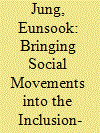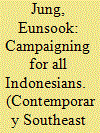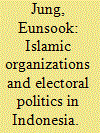| Srl | Item |
| 1 |
ID:
181396


|
|
|
|
|
| Summary/Abstract |
Many scholars argue that democracy tames religious fundamentalism. This inclusion-moderation theory holds that when radical religious movements are incorporated in the democratic system, they have incentives to adhere to institutional frameworks to influence politics and access power. But despite these claims, we have witnessed a growing influence of religious fundamentalism in Asian democratic politics, with immoderation becoming prominent. Why have religious fundamentalist movements become influential in various democracies in Asia? How have they shaped policies? Using a most-different-systems approach, I investigate religious fundamentalism in two dissimilar democracies: Islamic fundamentalism in Indonesia and Christian fundamentalism in South Korea. In both cases, I argue that religious fundamentalist movements facilitate immoderate politics through strong mobilization capacity, agenda-setting power, and framing. The study contributes to the inclusion-moderation literature through its discussion of religious fundamentalism and its cross-religious comparison.
|
|
|
|
|
|
|
|
|
|
|
|
|
|
|
|
| 2 |
ID:
149541


|
|
|
|
|
| Summary/Abstract |
Many scholars argue that democratization is conducive to the development of social welfare policies and that democracy brings about redistributive reform due to demands from the newly enfranchised poor. In reality, however, democratization does not necessarily bring about comprehensive social welfare reform. If not democratization, what explains social welfare expansion in developing countries? This article examines Indonesia, which began the process of democratization in 1998 following the fall of President soeharto, and which has since become a stable democracy with a consistently growing economy. More than a decade after soeharto’s resignation, Indonesia started to implement a comprehensive healthcare policy. What explains the gap between the enactment and the implementation of this social policy reform? In answering this question, I argue that electoral competition alone does not shape social policy reform. Instead, social reform has institutional prerequisites, such as the broad-based organization of its advocates. A broad-based organization goes beyond its narrow interests, builds cross-class alliance and pressures the government. Without this prerequisite, democratization does not necessarily result in comprehensive social reforms.
|
|
|
|
|
|
|
|
|
|
|
|
|
|
|
|
| 3 |
ID:
130576


|
|
|
|
|
| Publication |
2014.
|
| Summary/Abstract |
What role do Muslim social and educational organizations play in Indonesian politics after democratization? When democratization opens up a larger political space for Islamic organizations to participate in politics, do Muslim organizations emerge as political powers or remain socio-religious organizations? How do Muslim organizations engage in electoral politics? This article addresses these questions by examining the role of Muhammadiyah in democratic Indonesian politics. The author argues that Muhammadiyah's political behaviour is driven by its institutional logic, which places its religious and social duties before its political interests. Although there have been attempts by some elites to take advantage of Muhammadiyah for their own political gains, Muhammadiyah has managed to refrain from building or supporting a particular political party at the organizational level. Moreover, political learning through unsuccessful outcomes in initial elections and bitter experience with PKS also alerted Muhammadiyah to the need to protect itself from partisan politics by emphasizing its organizational principle. This article also demonstrates how religious institutions use politics for religious ends and to confirm the integrity of their community.
|
|
|
|
|
|
|
|
|
|
|
|
|
|
|
|